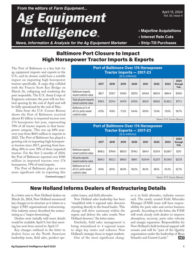As the dark clouds of the gathering storm begin to overshadow the prevailing economic prosperity, equipment dealers would be wise and prudent to assess the long-term efficacy of their existing sales force. Rather than wait until the next market downturn, why not take this opportunity to get ahead of the economic curve and purge your sales staff of any and all malcontents and misanthropes?
In addition to the usual suspects, i.e., those with a poor or negative attitude, and/or those who are insubordinate or insouciant, a bevy of other behaviorally challenged sales personnel should be evaluated as to their long-term potential with the dealership. The first operational casualty should be that salesperson who continues to seek comfort in the confines of the dealership. This individual should be informed that future employment will be a function of calling on customers where they work or live, rather than waiting for them to walk through the door proclaiming their desire to purchase. These dinosaurs will sulk and cry but really, what are their choices? Do you really think another dealership would want to hire them? Well, on second thought, maybe there are dealerships out there who want companionship as they sit on the precipice staring into Nietzsche’s abyss.
I’m often asked if I would make an exception to the hard and fast generalizations that are the trademark of a consultant. And, of course, the answer is an emphatic yes. As was stated in the previous column, if the business is a consumer oriented business, or does a sizable amount of wholegood sales with consumers rather than capital goods purchasers, then the dealership would be wise to retain an inside salesperson. Similarly, if, because of longevity or market exigencies, a salesperson has developed a following and the records show that he is selling $8 million dollars of machines at an 8% gross margin, then I would certainly entertain the notion of letting him sit in the dealership.
But, in the case of the inside salesperson in the capital goods industry, his/her territory becomes his existing customers. All other customers in the trade area would be the responsibility of the salesperson assigned to that territory. If the inside salesperson loses a customer, so be it, as he will not be capable of picking up additional customers. That means any sales or gross margins that materialize in the dealership with the inside salesperson, other than with his carefully selected, previously designated clients, would be credited to the salesperson who works that purchaser’s territory. Similarly, any commissions that were earned would be paid to the salesperson responsible for working the customer’s territory.
The point is, that inside sales people cannot have it all ways. They can’t sit in the dealership in the belief that they are doing their existing customers a favor, while concomitantly cherry picking the customers from the other sales personnel territories who are out doing what they are retained to do. The client base of the inside sales personnel should be limited to end-users who have purchased at least three major pieces of equipment over at least a three-year period. A one off purchase does not make a customer for life.
The next operational casualty should be that salesperson that is underperforming yet requires a high level of maintenance. This is the salesperson that is always late with his paperwork, consistently submits tardy expense reports, or refuses to learn how to use a computer to simply his life and his career. If this individual cannot be coached or encouraged to ameliorate these bad habits, then he should be encouraged to seek employment elsewhere. Again, would exceptions be made, and again, the answer is yes, provided that this person is generating $8 million in sales with an 8% gross margin.
The third type of existing salesperson that should be considered expendable, sooner rather than later, is that individual who refuses to follow dealership sales policies, provided that such policies are in place. This is the salesperson that won’t complete a call schedule or a call report. This is the salesperson who finds reasons for not completing a specified number of on-site calls. Or, this is the salesperson that resists completing comprehensive profile data for each of his existing customers.
One of the major responsibilities of a dealer/sales manager is to clarify the tasks and responsibilities for which each and every salesperson should be held accountable. The previous paragraph illustrates such responsibilities. Do you really need an employee who won’t, for whatever reason, follow dealership policy? Do you really need an employee who refuses to complete customer profiles that in turn should be used to facilitate future sales and increase gross margins?
Smart dealers will use this period of economic prosperity to prepare for the next cyclical downturn. Rather than waiting for the market to decline, smart dealers will replace non-performing, underperforming, or behaviorally challenged sales personnel now, in the hopes of having their replacement “up and running” at full throttle when that downturn occurs. While exceptions are acceptable, they should not become the norm. Instead, dealers and sales managers would be wise to follow the maxim espoused by Jimmy Johnson when he took over the Miami Dolphins several years ago when he declared: “I will be very consistent, I will treat every player differently.”




Post a comment
Report Abusive Comment